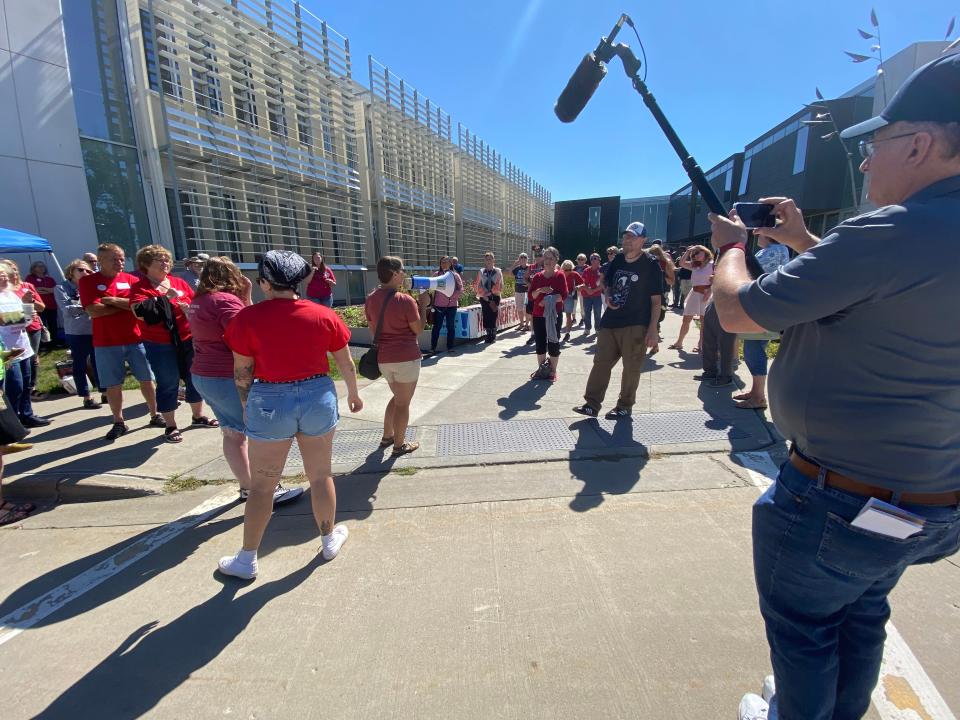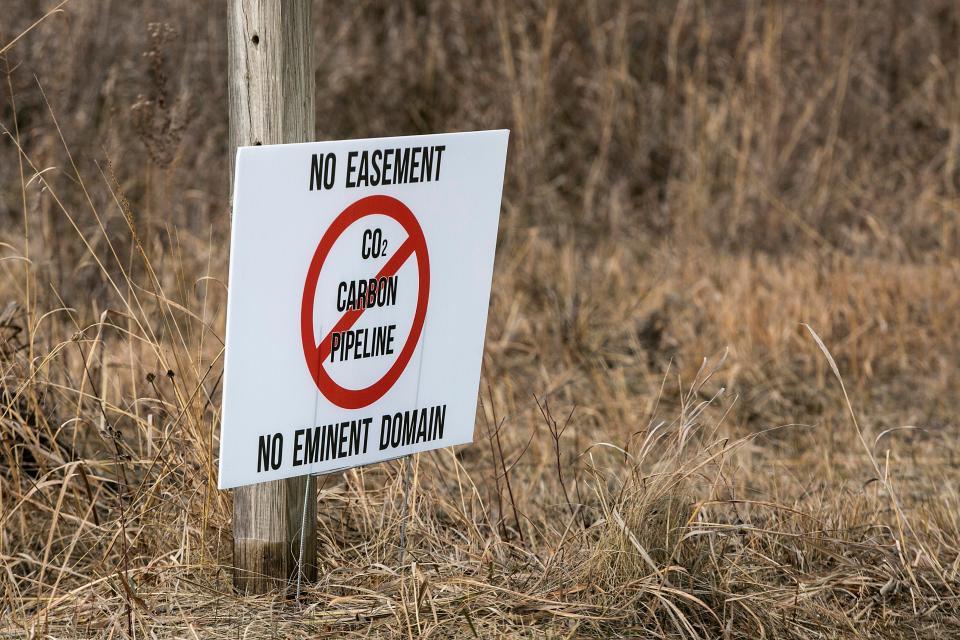'The risk is not worth it': Iowans ask regulators to reject proposed carbon capture pipelines
Zachary Ide played a message his grandmother left him a few years ago as workers built the Dakota Access pipeline through her family's farm.
Her voice cracking, Reba McWilliams apologized to her grandson for calling him at work. But she said she had to tell someone. "Everything is tore up," McWilliams said in the recording. "They're plowing around in the mud," damage that could take years to repair.
Now another pipeline company, Navigator CO2 Ventures, wants to dig through the family's Mahaska County farm, Ide said.
"Your decision to allow eminent domain hurt countless farmers" with the Dakota Access pipeline, a controversial crude oil pipeline that cuts across 18 Iowa counties, carrying 750,000 barrels of crude daily from North Dakota to Illinois.

"Now here we are again," said Ide, who was one of nearly two dozen farmers, landowners and environmentalists who pleaded with the Iowa Utilities Board on Tuesday to deny construction of three proposed carbon capture pipeline projects through Iowa.
More: What we know about three carbon capture pipelines proposed in Iowa
As with Dakota Access, many of the concerns voiced Tuesday centered on the possibility the pipeline developers — Navigator CO2, Summit Carbon Solutions and Archer-Daniels-Midland — could receive eminent domain powers, enabling the companies to force unwilling landowners to sell access to their land for construction.
Other opponents cited concerns about the pipelines' safety and the impact construction would have on farmland and underground drainage systems used to move water from fields to improve yields.
Navigator, Summit and ADM have proposed capturing carbon dioxide from ethanol, fertilizer and other industrial ag plants, liquefying it under pressure, and transporting it via the pipelines from Iowa and other Midwestern states to locations in North Dakota and Illinois, where they plan to sequester it deep underground.
"The risk is not worth it to my family. And it's not worth it to all the communities along the pipeline," said Ide, whose grandmother battled cancer at the same time she fought the Dakota Access pipeline. She died in 2020.
"We have all the risks and none of the benefits," he said. At the same time, "a few get rich, playing games with carbon credits" provided by the federal government.
A study by Food & Water Watch, a national environmental group with Iowa organizers, estimates that the three pipeline developers could snag $23 billion in federal tax credits for the projects over a dozen years.
MORE: Iowa politics, ag heavyweight Bruce Rastetter sets sights on $4.5 billion carbon capture pipeline
The companies say the projects will help ethanol and other energy-intensive agricultural industries remain viable as the nation seeks to cut net greenhouse emissions in half by 2030 to address climate change.
Only Summit Carbon has petitioned the Iowa Utilities Board for a permit to build the hazardous liquid pipeline. In addition to commenting at the board meeting Tuesday, hundreds of Iowans have filed comments with the state, many of them in opposition to the projects.
Summit Carbon's Jess Harris said in a statement Tuesday that Sierra Club of Iowa, one of the pipeline opponents, is fighting carbon capture and storage projects because it wants to eliminate the use of ethanol.
Iowa is the nation's largest producer of ethanol, with about half of the state's corn crop used to make the renewable fuel. At least one study shows the biofuel has 46% fewer greenhouse gas emissions than gasoline.
Summit and other pipeline developers say the projects can significantly lower ethanol's greenhouse gas emissions, qualifying it for use in markets like California and Oregon, states that are demanding ever-lower carbon fuels.

Several ethanol companies have joined the carbon capture projects, including Poet, the nation's largest ethanol producer. The South Dakota producer said last month it joined Navigator's $3 billion pipeline project.
"While the Sierra Club may bring a handful of people to a meeting in Des Moines, Summit Carbon Solutions will continue to focus our efforts on partnering with landowners to negotiate voluntary easements," Harris said in a statement.
"To date, we have successfully negotiated voluntary agreements with more than 600 Iowa landowners and nearly 2,000 total agreements across the five states where our project is proposed to be located," he said.
The company says it has agreements with about 40% of the Iowa landowners needed.
James Norris, whose Montgomery County farm is in the path of Summit's pipeline, said the projects "aren't the saviors of ethanol."
"If they were, every farmer would be lined up behind these projects," Norris said. "And they will have virtually no positive impact on the climate issue. If they did, climate organizations would back these projects."
"All these pipelines offer are permanent damage to our farms and real danger to our communities," he said. "This is all wrapped up in billions of dollars of subsidies and tax credits and massive corporate welfare."
"The ability for for-profit corporations to seize our land, while being stuffed full of cash from the American taxpayer, is criminal," Norris said.
The Iowa Utilities Board hasn't set a hearing date for Summit's pipeline request.
Donnelle Eller covers agriculture, the environment and energy for the Register. Reach her at deller@registermedia.com or 515-284-8457.
This article originally appeared on Des Moines Register: Iowans ask state regulators to reject three carbon capture pipelines

